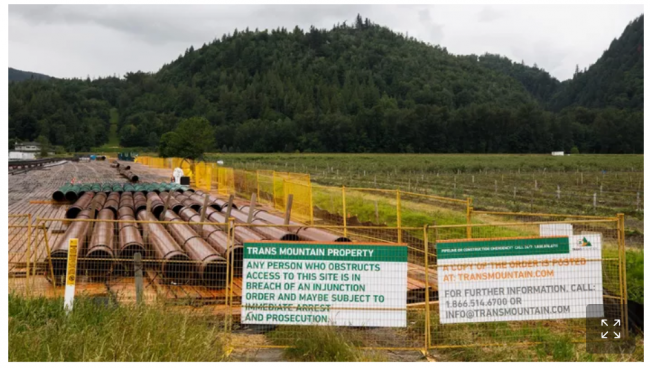Articles Menu

The Trans Mountain pipeline, which supplies about 90 per cent of the fuel needed in the Lower Mainland, was shut down for three weeks after heavy rains damaged major highways, flooded communities and caused deadly mudslides. It restarted on Dec. 5 at reduced pressure, and is not expected to return to full capacity until late January. The pipeline carries oil and refined products from the Edmonton area to an export terminal near Vancouver, the Parkland refinery in Burnaby, and refineries in Washington State.
Michael Davies, Trans Mountain’s chief operating officer, said in an interview Tuesday the company spent the 21 days of the shutdown with a crew of 470 building access routes, inspecting and repairing the existing pipeline. At the same time, the company is having to look at construction changes for the expansion project.
“On the Coldwater River, the flow has changed substantially in some places, and we will have to redesign or reconfigure the design of those crossings,” he said. “We have a route established where we were planning to cross the river, but the river may be in a different place now. There may be some rework to redesign the crossings – we might use a different technique to go wider and deeper. And there might even be potential for some minor reroutes because of how the river has changed.”
The river broke its banks on Nov. 15, carving out a new channel and causing extensive damage in the city of Merritt.
Trans Mountain’s $12.6-billion expansion project, which will triple the capacity of the existing pipeline, is scheduled to be finished by the end of next year following multiple delays. Prime Minister Justin Trudeau’s government bought the pipeline from Kinder Morgan in 2018 amid legal hurdles and opposition from Indigenous communities, environmentalists and the provincial government. The Federal Court of Appeal overturned the pipeline project’s approval, ruling that Ottawa had failed to adequately consult First Nations or consider the risk to southern resident killer whales.
The government held a new round of consultations and did more work on the marine risk. The federal cabinet approved the expansion for the second time in 2019, but the company will have to tread carefully to avoid reopening the environmental approval process.
Mr. Davies said the expansion approval granted by the Canada Energy Regulator does allow for minor adjustments within the approved pipeline corridor. “So there’s obviously a spectrum in there. And we would try to keep it to the less-disruptive end of the spectrum,” he said.
He said it is too early to assess the cost of the shutdown, which led to temporary gas rationing in the Lower Mainland, the Sea-to-Sky region, the Sunshine Coast, the Gulf Islands and Vancouver Island. The direct costs will be in the tens of millions of dollars, he said, but there is also the economic impact of the more than six million barrels of oil that did not ship during the shutdown.
The three heavy rain events that swept across British Columbia in November have caused likely billions of dollars in damage across the province and will force a reassessment of how B.C. prepares for climate change in the future. For the pipeline, Mr. Davies said, “generally, the system was very resilient.”
He said the worst damage was along a 30-kilometre-long section around the Coldwater River that scoured out sections of the pipeline. Crews built a temporary bridge over the river to access the pipeline, removing logs and constructing new protective earthworks.
[Top photo: Material for the Trans Mountain Pipeline project sits in a storage lot outside of Abbotsford, B.C., on June 6.COLE BURSTON/AFP/GETTY IMAGES]